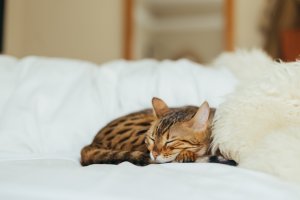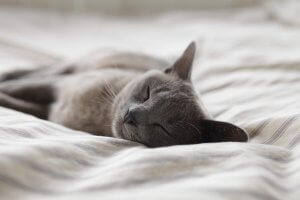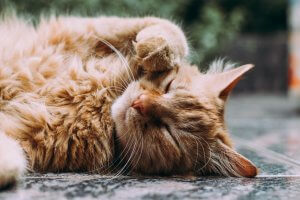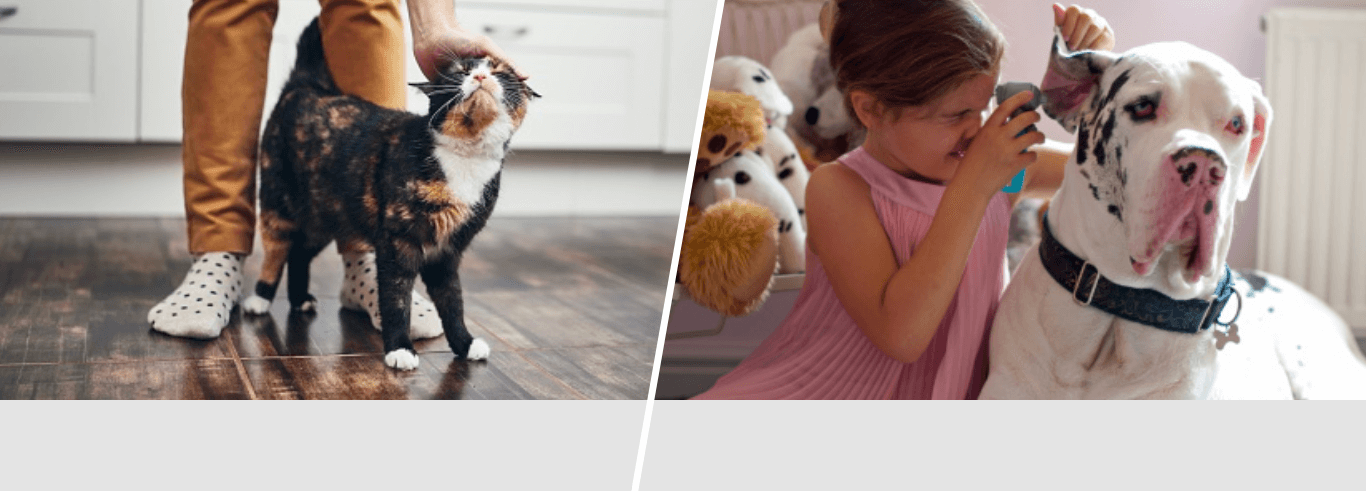Why does my cat snore?
We all know that cats like to sleep for hours on end each day. During their ‘catnaps’, you may have noticed your cat snoring like a human. As adorable as it may be, you’re probably wondering why your cat snores and if it’s normal.
Well, if you notice your cat snoring every once in a while or they’ve always snored and you don’t suspect any illness, you probably have nothing to worry about. Here are some reasons why your cat might be snoring, and also how you can tell whether your cat’s snoring could be a sign of a more serious problem.
Why do cats snore?
Just like humans, cats can snore for various reasons. Did you know cats also go through the same sleep cycles as us? When your cat snores, they are typically in a deeper non-REM cycle of sleep where their body is fully relaxed. When you see your cat twitching or see their feet pattering like they’re running, they are experiencing Rapid Eye Movement (REM) sleep. Jerking facial expressions can also be a display of REM sleep.
Cat health problems can also have an impact on your cat’s likelihood of snoring. If your cat suffers from upper respiratory infections or chronic nasal inflammation or rhinitis, it’s likely that they’re prone to snoring.
Is it normal for cats to snore?
Although you may be concerned that your cat’s snoring is a sign of a more serious problem, there are a few reasons why your cat’s snoring can be completely normal.
Your cat’s sleeping position
Your cat may be snoring as a result of the position they’re sleeping in. If your furry friend is sleeping in a funny or unusual position, that may be a likely cause for their snoring. Most likely they’ll stop once they’ve changed positions.
Your cat is overweight
Your cat’s weight has a lot to do with their quality of sleep. Sometimes, overweight cats do not get the sleep they need because their extra weight leads to fat accumulation in the tissues surrounding their upper airways. This added pressure on your cat’s nasal passages causes them to snore. Reducing your cat’s weight can help their sleep quality incredibly.
Your cat is a brachycephalic breed
Is your cat one of the brachycephalic breeds? These breeds have wide heads and are short in stature. These are breeds such as the Persian, Himalayan, Burmese, and British Shorthair. Due to the shortened bones in their face, the brachycephalic breeds of cats are more susceptible to snoring. These breeds also often have smaller nostrils which restrict breathing.
Your cat has always snored
If your cat has always snored and hasn’t shown any other signs of illness, then you shouldn’t have anything to worry about. However, always consult with your vet if you do have any concerns about your cat’s snoring.
You have dry air in the house
Another reason that could be causing your cat to snore is the dry air in your house. This can have the same effect on your cat as it does on humans. As a simple solution, you could try putting a humidifier next to where they sleep.
When is snoring a potential problem?
There are several examples of when your cat’s snoring could be an indication of a larger issue.
Signs to look out for include:
- You’ve noticed that your cat starts snoring suddenly and their behaviour begins changing.
- You’ve seen a drop in your cat’s appetite.
- Your cat is more lethargic than usual.
- Your cat is panting, coughing or breathing through their mouth.
- Your cat has discharge from their eyes or nose.
- Your cat has sores on their nose.
If your cat is panting, coughing, or breathing through their mouth, this could point to a nasal problem. This might be a result of a respiratory issue, feline asthma, or even a tumour in their sinuses or nasal passage. Similarly, if your cat has symptoms, such as discharge from the eyes and/or nose or you find sores on their nose, their snoring might be from a build up of mucus due to an upper respiratory infection.
You should consult with your vet if you spot any of these signs in your cat.
When to seek an emergency vet
There are instances where you will need to seek an emergency vet immediately.
If you notice your cat’s breathing is short and quick, or their neck is extended and they’re breathing rapidly, you should seek a vet immediately. This could be a sign of laboured breathing, which is also known as dyspnea.
The snoring could also be the result of a dental issue. If you notice your cat’s face starting to swell, it may be an indication of a tooth root abscess. This can be very painful for your cat and requires immediate treatment.
Helping your cat to stop snoring
Depending on why your cat is snoring, there are ways to help them stop. Foreign objects, tumours, and polyps can all be removed by your vet. Losing weight can also help your feline friend lessen their snoring habits. As long as you’re aware of the symptoms to look out for, snoring is rather harmless and pretty cute so try not to be overly concerned. However, as cats often don’t show signs of illness until they’re very sick, it’s important that you monitor your feline friend’s snoring.
If you’re looking for extra peace of mind, a cat tracker can identify any small changes in your cat’s behaviour like their sleeping and eating habits. It can also track your cat and monitor their activity. If you’re trying to help them lose weight, you’ll know where to start.
Now you know a little more about your cat’s snoring, remember it’s important to protect yourself from unexpected vet bills with Argos Pet Insurance provided by Pinnacle Insurance Ltd. Explore our cat insurance policies today.
Argos Limited is an Appointed Representative of Home Retail Group Insurance Services Limited (HIS). HIS is authorised and regulated by the Financial Conduct Authority (register number 314050). Registered office: 33 Charterhouse Street, London, EC1M 6HA (registered in England and Wales, no 04109436). HIS act as an introducer to Pinnacle Insurance Ltd, who sell, administer and underwrite the policy and who are authorised by the Prudential Regulation Authority and regulated by the Financial Conduct Authority and the Prudential Regulation Authority (register number 110866). Registered office: 4th Floor, Limelight, Elstree Way, Borehamwood, Hertfordshire, WD6 1JH (registered in England and Wales, no 01007798). HIS and Pinnacle Insurance Ltd are not part of the same corporate group.
We do not provide personal recommendations to customers.
 Sorry, our lines are now closed
Sorry, our lines are now closed






